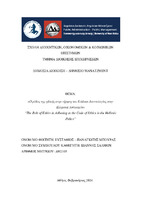| dc.contributor.advisor | Σαλμόν, Ιωάννης | |
| dc.contributor.author | Μπούρας, Ευστάθιος Παναγιώτης | |
| dc.date.accessioned | 2024-04-18T08:38:09Z | |
| dc.date.available | 2024-04-18T08:38:09Z | |
| dc.date.issued | 2024-04-08 | |
| dc.identifier.uri | https://polynoe.lib.uniwa.gr/xmlui/handle/11400/6509 | |
| dc.identifier.uri | http://dx.doi.org/10.26265/polynoe-6345 | |
| dc.description.abstract | Η Αστυνομία αποτελεί έναν βασικό διοικητικό θεσμό του κράτους από τον 19ο αιώνα, οπότε και πραγματοποιήθηκε η Ελληνική Επανάσταση, μέχρι σήμερα. Κύρια αποστολή της διαχρονικά είναι η τήρηση της δημόσιας τάξης και της δημόσιας ασφάλειας. Η εκπλήρωση αυτής της αποστολής προϋποθέτει τη δράση του αστυνομικού προσωπικού με ηθικό τρόπο, ο οποίος παρουσιάζεται στον Κώδικα Δεοντολογίας του Αστυνομικού (2004). Η υιοθέτηση μιας ηθικής συμπεριφοράς ως δημόσιος υπάλληλος και δη ως αστυνομικός αποκτά ιδιαίτερη σημασία, επειδή συμβάλλει στην επίτευξη του απώτερου σκοπού κάθε κράτους, του δημόσιου
συμφέροντος, αλλά ταυτόχρονα και στην επίδειξη σεβασμού και εμπιστοσύνης των πολιτών απέναντι στο έργο της Ελληνικής Αστυνομίας. Όμως, η υποχρέωση τήρησης ενός Κώδικα Δεοντολογίας δεν επαρκεί για την προώθηση της ηθικής. Αντίθετα,
χρειάζεται η διαμόρφωση πολιτικών και η λήψη μέτρων που αφορούν την στελέχωση, την οργάνωση και τη λειτουργία της Ελληνικής Αστυνομίας αλλά πρωτίστως να συνειδητοποιηθεί ότι η διάχυση της ηθικής είναι εφικτή και μπορεί να οδηγήσει σε
αποτελεσματικότερη δράση, αρκεί να υφίσταται μια δυναμική Διοίκηση και μια ισχυρή πολιτική βούληση. | el |
| dc.format.extent | 88 | el |
| dc.language.iso | el | el |
| dc.publisher | Πανεπιστήμιο Δυτικής Αττικής | el |
| dc.rights | Αναφορά Δημιουργού - Μη Εμπορική Χρήση - Παρόμοια Διανομή 4.0 Διεθνές | * |
| dc.rights | Attribution-NonCommercial-NoDerivatives 4.0 Διεθνές | * |
| dc.rights.uri | http://creativecommons.org/licenses/by-nc-nd/4.0/ | * |
| dc.subject | Κώδικας δεοντολογίας | el |
| dc.subject | Ελληνική Αστυνομία | el |
| dc.title | Ο ρόλος της ηθικής στην τήρηση του κώδικα δεοντολογίας στην Ελληνική Αστυνομία | el |
| dc.title.alternative | The role of ethics in adhering to the code of ethics in the Hellenic Police | el |
| dc.type | Μεταπτυχιακή διπλωματική εργασία | el |
| dc.contributor.committee | Tsotsolas, Nikos | |
| dc.contributor.committee | Νταλιάνης, Κλήμης | |
| dc.contributor.faculty | Σχολή Διοικητικών, Οικονομικών & Κοινωνικών Επιστημών | el |
| dc.contributor.department | Τμήμα Διοίκησης Επιχειρήσεων | el |
| dc.contributor.master | Δημόσια Διοίκηση – Δημόσιο Μάνατζμεντ | el |
| dc.description.abstracttranslated | The Police has been a fundamental administrative institution of the state since the 19th century, coinciding with the Greek Revolution took place, up to the present day. Its primary mission throughout time is the maintenance of public order and public safety. The fulfillment of this mission presupposes the action of police personnel in an ethical manner, as outlined in the Code of Ethics of the Police (2004). Adopting ethical behavior as a public servant, especially as a police officer, is of particular significance,
because it contributes to the achievement of the ultimate goal of any state, the public interest, while simultaneously demonstrating respect and trust of the citizens towards the work of the Hellenic Police. However, the obligation to adhere to a Code of Ethics
is not sufficient for the promotion of ethics. On the contrary, it requires the formulation of policies and the implementation of measures, concerning the staffing, organization and operation of the Hellenic Police, but above all, an awareness that the dissemination of ethics is feasible and can lead to more effective action, provided there is a dynamic administration and strong political will. | el |



